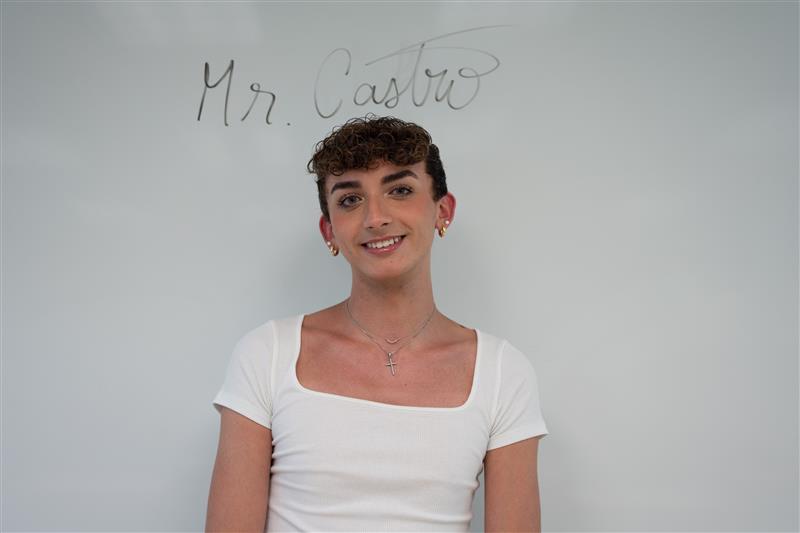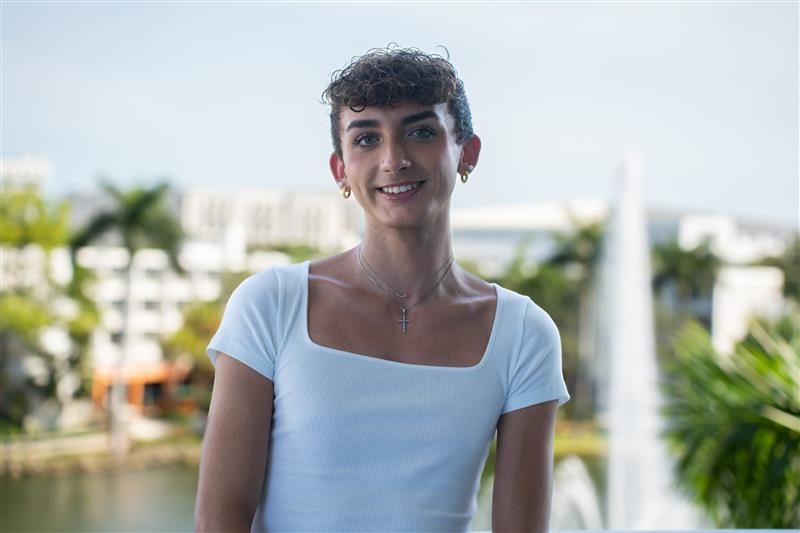Some young students have never seen a man dressed like John Castro in their classroom. One of his casual outfits might include clip-on nails, pearl and hoop earrings, a tank top and some makeup.
“Nothing I’m wearing is really that revolutionary,” Castro said. “I definitely think it’s just the ‘wow’ factor of a guy who’s wearing these women’s clothing.”
An elementary education major and aspiring teacher at the University of Miami, Castro works in spaces with young children often. This past year he volunteered at the nearby Gibson and Bethel Community Center.
While volunteering, Castro would hear questions along the lines of “Why do you have nails?” or “Why do you wear that?” For children, with their vague preconceived notion of how men are supposed to look, the questions flowed without a filter.
Their boldness sometimes put Castro on edge, especially being in Florida where sexuality and gender have become charged topics in schools. He rarely had to justify his appearance through his high school and college career, but he recognizes the kids’ questions come from a place of curiosity rather than prejudice.
He believes they are more so pointing out a difference than questioning an aspect of his identity.
“When kids see someone of my outwardly gayness, they don’t have these preconceived notions about it,” Castro said. “But it’s the parents of these kids, the people I might be working with, the principals of the school. Where am I even going to get hired, especially with all these laws being passed? And all these people in full support of them?”

Castro wants to provide an answer to the kids’ questions that’s consistent with his own identity, but will not terminate his career. For him, that doesn’t necessarily entail speaking to his own sexuality or gender. Instead, he wants his students to understand the many different ways one can express oneself.
“I don’t think it’s necessarily my job to show them these different people, but to be prepared for when these different types of people come into their lives,” Castro said. “It’s ridiculous how if I were to have a picture of my husband on my desk, and a kid asked me about it, it makes no sense why I can’t say anything about it.”
There is no law that bans Castro from having a picture of his hypothetical husband on his desk, but the vagueness of the new laws sparks confusion. It is unclear whether Castro could speak openly about his relationship.
The Parental Rights in Education law, infamously dubbed the “Don’t Say Gay” bill while it was in the legislature, mandates that K-3 teachers do not instruct “in a manner that is not age-appropriate or developmentally appropriate for students.”
A Florida elementary school in Orange County made national news after some teachers were told they could not display pictures of their same-sex spouse in a K-3 classroom. The district later told teachers they were allowed to show pictures of their spouse regardless of their sexuality.
However, according to the Orange County Public Schools’ district spokesperson, “in K-3, it was cautioned against specific discussions in the event those discussions could be deemed classroom instruction on sexual orientation or gender identity.”
The episode left Orange County teachers confused.
“I think these laws and all that stuff has definitely pushed me further away. There’s zero chance of me staying here after college and teaching here,” Castro said.
Instead, he feels more comfortable returning home to Long Island and hopefully teaching at his former elementary school. Castro’s style of dress only came up once in his high school, a Catholic school that required a uniform, and he has never been bullied about his appearance in Miami. It’s only the laws and the people supporting them that gives him pause.
“What a loss if the legislative threats that are coming down prevent John and similar students from being a teacher in a Florida classroom,” said Jenny Krawec, Castro’s former professor in the School of Education and Human Development. “He would be an awesome teacher and how sad if my daughter never gets to learn from John.”
The state’s new role in Florida classrooms and a parent’s power to discipline teachers makes Castro uneasy about teaching in Florida. The issue doesn’t stem from specific prohibitions in the classroom, but rather the confusion and chilling effect of the new laws.
“It places an extreme caution around the general topic, more so even than the letter of the law would imply,” Krawec said.
Florida Gov. Ron DeSantis’ media team wrote in one press release that the laws will protect children’s innocence. Manny Diaz, Jr., DeSantis’ Commissioner of Education, echoed the governor, saying that these laws will protect children from “inappropriate topics.”
Krawec notes that conversations about these topics, such as sexuality and gender, do not have to be inherently inappropriate. She described an environment where children in the classroom can share that they have two dads, only have a mom or are raised by their grandparents, allowing them to see other ways of living perhaps different from their own.
“I think it’s in building community,” Krawec said.
She added that books can offer a similar opportunity.
“We often exist in communities that are similar to ourselves, and books provide that door to another world or another experience,” Krawec said. “I do think that’s how it starts and that’s what we’re not allowed to do right now.”
Krawec noted that the stakes are high in these situations. In October, 2022, the state quietly added a rule to HB 1557 specifying that the Commissioner of Florida “may pursue disciplinary action against the license of an educator who violates the principles.”
The specification follows another amendment to the bill that mandates non-compliant school districts to pay damages and court fees if they are sued.
Florida is already facing a teacher shortage, as is much of the country. Each year, the state highlights “critical teacher shortage areas” as stipulated by law. In schools described as “High-Density, Low-Economic Urban Schools,” 10.5% of courses were taught by teachers without a certification in that field. In “Low-Density, Low-Economic Rural Schools,” the number was 8%.
According to the Learning Policy Institute, Florida ranks last in the “teaching attractiveness rating” based on teacher compensation, working conditions, school resources, turnover and hiring, and qualifications.
“All of us, I think, benefit from diverse perspectives and differences and I think we’re at risk of losing some awesome teachers because of it,” Krawec said.







